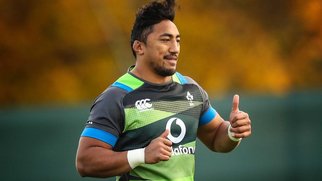
The period of residency will extend to five years from 2020.
Neil Francis, a former Irish international and now a media analyst, was very vocal in his criticism of the selection of Aki. He wrote “It is wrong, irrespective of how good he is, that an Irishman born and bred here should sit on the sideline while somebody who has no connection whatsoever with this country, other than drawing a large wage, takes his place”. He also said “The prime criteria for being selected to play for Ireland is that you be Irish above all other things. You can be committed to the cause, but you can be paid to be committed to the cause. You can learn the anthem. You can die for the jersey. Pick a jersey, any jersey and I will die for it. You can quote rule 8 to me as long as you like but you can't trade out your heritage”.
Ewan McKenna wrote that the residency rule is a form of financial doping.
Bundee Aki is not the first player to qualify and be selected by Ireland under the residency rule. CJ Stander’s and Jared Payne’s inclusion have also been questioned. In the Irish squad for the Autumn Series there are several Irish players born outside of Ireland. It’s unclear where this leaves Neil Francis’ suggestion that we should always favour an “Irishman born and bred”. As well as Stander and Aki, those born outside of Ireland include Ultan Dillane, Kieran Treadwell, Joey Carbery, Kieran Marmion, CJ Stander, and Rob Herring. Some have Irish parents and came to Ireland when young, such as Dillane and Carbery. Treadwell and Marmion have Irish parents but did not go to school in Ireland.
There are at least two issues being raised here. The first is what makes somebody Irish. Is a player born in, say, the US whose grandfather left Ireland as a child and who has never visited Ireland ‘more Irish’ than a player who has chosen to spend a substantial portion of his career in Ireland, married an Irish person, and raising a young family born in Ireland? The latter case describes Jared Payne. Identity is becoming a more complex concept as the world becomes more integrated. There is no clear way of defining Irishness, and it is getting even more difficult.
Second is the issue of “financial doping”. This is alarmist. Doping is associated with rule breaking. There are no rules being broken. The residency requirements apply to all countries and many countries use them more than Ireland. The difficulty in individual cases means it is good for World Rugby to set clear rules on eligibility.
There is a more worrying development into which the furore over “heritage” and “Irishness” feeds. Ireland is a small country with a large diaspora. There are Irish people all over the world. Many families were forced to leave Ireland to get jobs and/or to escape a repressive social climate. Should their children and grandchildren be considered less Irish than the descendants of those who remained? The Irish football team has a long history of selecting players (in line with the rules on eligibility from FIFA) who have at least one Irish grandparent and have no other connection with the country. In the recent squad for the play off against Denmark, 10 of the 26 players were born outside of Ireland.
Scott Hogan is the most recent new recruit that fits that bill. In Irish football there has rarely been any controversy that these players are less Irish than those born here. However, Cyrus Christie has revealed the racist abuse he has received following Ireland’s disappointing defeat against Denmark in the World Cup playoff. He has revealed this has been going on throughout the campaign and includes calls for him to go back to “where he came from”. It is telling that white players born outside Ireland are not told that.
The terms of ‘heritage’, ‘blood’, and ‘born and bred’ being used in reference to a player’s chosen identity open the door to those who feel some, because of their ethnicity, are less than Irish. If a player chooses to play for Ireland we should welcome him or her as one of our own.
 RSS Feed
RSS Feed